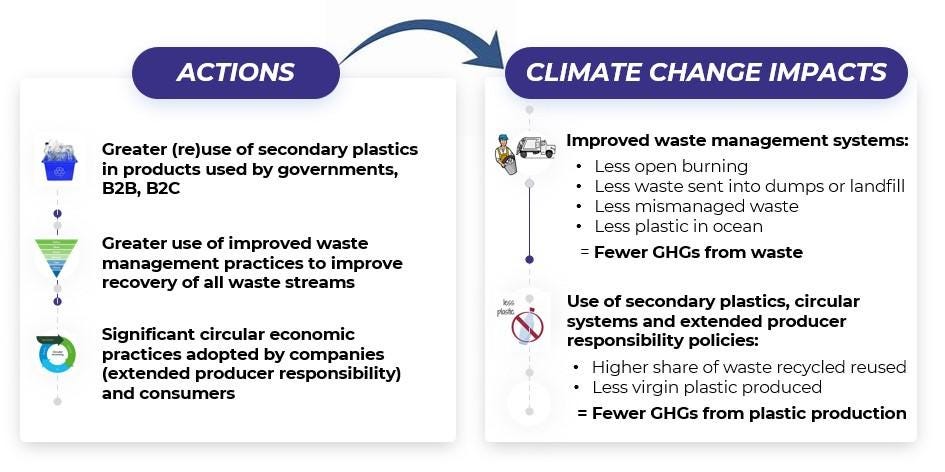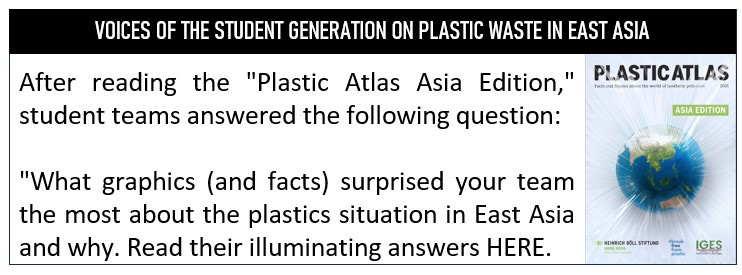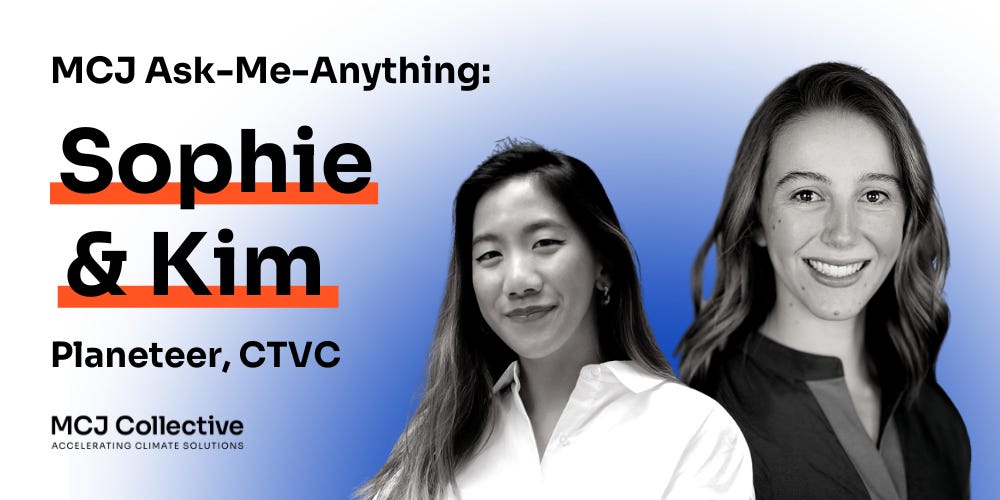Making the Case for Scaling Local Ground-Level Efforts to Reduce Plastic Waste
by Rob Steir, Aarti Desai and Frances Mendoza, CAPP.Global
In 2019, plastic-related emissions were estimated to equal 189 five-hundred megawatt coal power plants. Millions of tons of plastic end up in the ocean each year where they release GHGs as they slowly break down. This may also interfere with the ocean’s capacity to absorb and sequester carbon dioxide. Not to mention, fish eat the plastic and we eat the fish. A 2022 OECD report warns that “in the absence of more stringent policies” we could well see by 2060:
With new global policy frameworks in place, these ominous results could potentially be avoided. Much hope is being placed on the shoulders of the current negotiations of the UN Plastics Treaty, which is due to be concluded at the end of 2024. In theory, the treaty will prompt states, corporations and NGOs to provide resources and financial commitments that fuel new and expanded local plastic waste-reducing initiatives. The projects are expected to carry significant climate change benefits as well:
A Cautionary Tale About Plastic Waste Policy – Let’s Not Repeat the Past
The above policy-led playbook, however, is not new. History has shown that policy guidelines and corresponding commitments have not always been met or made a difference when it comes to reducing plastic pollution. Previous decades of limited action by government and corporations leave a decidedly mixed track record.
Two detailed studies provide supporting evidence. A 2020 report conducted by Ocean Recovery Alliance analyzed 580 voluntary commitments made by countries, NGOs and corporations from 2014-2018. Its main conclusion was that voluntary commitments are often not followed up on, as there is little transparency, nor governance from a higher authority to enforce such commitments. Additionally, a recent study by the University of Portmouth’s Global Plastics Policy Centre broke down 100 global plastic waste policies over the past four decades and found a lack of lasting support, follow-through and, therefore, weaker than expected real-life results.
Today, beyond policies and commitments, there are thousands of “on-the-ground, local initiatives” designed by passionate and knowledgeable leaders who are creating viable solutions to reduce and eliminate plastic waste. This is exactly why CAPP – the Commitments Accelerator for Plastic Pollution – was founded: our goal is to showcase these promising plastic-reducing initiatives and help them scale with much needed capital resources, be learned from, and replicated.
Since its founding, CAPP has conducted three student team “Make the Case” competitions that took place in 2021 and 2022 in India and East Asia.
What We Learned: Important Issues for Relevant Stakeholders
Real impact is happening at the local ground level in every country by dedicated organizations. Their “in-the-trenches” work is often under-reported and underappreciated—surprisingly even by local communities.
Many of these proven initiatives, especially how they operate and what they have learned, could be captured, replicated and scaled to other locations. Some cannot.
Most of these initiatives had an unmet need for additional funds, community support and local government resources to ensure their local sustainability and long-term impact.
By the same token, a large number of these initiatives need to do a better job at “making their own case” for funding by keeping better performance records.
Exposing students to such programs provides a learning platform far beyond any coursework or readings, and creates a pool of students capable of contributing toward solutions to the world’s plastic pollution and climate change problems.
In sum, the UN Plastic Treaty is only likely to be a success should the world’s stakeholders effectively leverage and accelerate the excellent work that many organizations are already doing on the ground to reduce plastic waste.
From the Voices of University and Graduate Students – On Plastic Waste
My co-authors on this article are two students, Aarti Desai from India and Frances Mendoza from the Philippines. They participated on student teams in CAPP’s India and East Asia competitions. I asked them to reflect on the lessons of the competition and the broader implications of scaling local projects from their countries. In addition, CAPP put together a document featuring 40 East Asia student team commentaries about plastic waste and climate change based on surprising facts from 18 infographics within the Plastic Atlas Asia Edition.
To learn more, visit: https://capp.global/mcjarticle
Thoughts From Aarti Desai from India
Thoughts From Frances Mendoza from the Philippines
And the report, “Voices of the Student Generation”
How You Can Get Involved with CAPP and Make a Real Difference
Using one less plastic bag is no more than a basic starting point in the global battle to reduce plastic pollution. If all goes right, within five years, CAPP could help replicate and scale a number of deserving initiatives throughout the world, all of which were championed by student teams. There are a number of ways in which you can be involved: become a sponsor, become a future volunteer case study reviewer, or join our global volunteer team to help flesh out and transform our marketing and outreach programs. Check out https://capp.global/MCJvolunteering to learn more!
🍿 The Lean Back
Listen to the discussion with Dr. Vanessa Kerry here.
🎙️ My Climate Journey Podcast
👩⚕️ Jason caught up with Dr. Vanessa Kerry, co-founder and CEO of Seed Global Health and the recently appointed WHO Director-General Special Envoy for Climate Change and Health. The intersection of climate change and health is an important topic that doesn't get enough attention, and Dr. Kerry is the perfect person to learn from. Listen to the episode here.
💰 In the Capital Series, Jonah Goldman gave us an inside look at Breakthrough Energy, where he served as a longtime managing director. We covered Jonah’s journey to climate work, how Breakthrough is set up, the different areas in which they operate, how they've evolved over time, and more. Tune in to the Capital Series here.
🌤️ Yin talked to Alyssa Thomas, who oversees workforce development at SunPower. We discuss why more private companies are focusing workforce development as part of their business model, key levers that the US should focus on to address labor shortages in the clean energy sector. Listen to the Skilled Labor Series here.
👩💻 Climate Jobs
For more open positions, check out the #j-climatejobs channel in MCJ Slack as well as our MCJ Job Board.
Procurement Specialist at Air Company (Brooklyn, NY)
R&D Grants Program Manager at AMP Robotics (Remote)
Prototype Machinist at Avalanche Energy (Tukwila, WA)
Senior Workforce Administrator at Bloc Power (New York, NY)
Project Manager at Euclid Power (Houston, Dallas or Austin, TX)
Controls Engineer at Heirloom (Brisbane, CA)
Algorithms and Sensor Developer at Mill (San Bruno, CA)
Head of Chemistry at Noya (Oakland, CA)
Corporate Counsel - Commercial at Patch (San Francisco, CA)
Inside Sales Representative at SPAN (Atlanta, GA)
✨ Community Highlights
🚨 Reminder to all MCJ members to complete our 2023 Annual Survey: We greatly value your opinion, and you can make an outsized impact on the future of the community in less than a few minutes. Haven’t yet seen it? Search your inbox for ‘Help improve the MCJ Community! Complete our 4 minute community check-in’. Thank you for your time!
🗓 Climate Events
🙋♀️ MCJ AMA with Sophie & Kim, CTVC and Planeteer Capital: Keep the good NY Climate Week vibes going with a special Ask-Me-Anything session with Sophie Purdom and Kim Zou. RSVP here. Can’t make it? Submit your questions here and we’ll ask on your behalf. (Oct 4)
👩💻 MCJ + Climate People Career Advancement Meetup: A unique opportunity to learn from experts, build a strong community, and chart your path in the climate sector. (Sept 13)
🇬🇧 MCJ London September Social with Sustainable Ventures and Cleantech for UK: Converse and connect with entrepreneurs, operators, investors, academics, policymakers and more who are all passionate about climate solutions. (Sept 13)
👋 MCJ Community Welcome Call: Connect, share and learn with the MCJ team and community. (Sept 14)
🌱 MCJ Monthly Idea Jams, Nature-Based Solutions & Biodiversity: These sessions provide a chance for MCJ members to get help with roadblocks, meet co-founders or future employees, connect with investors, or people working on similar topics. (Sept 15)
🇫🇷 MCJ Paris Climate Tech Meetup: Quarterly gathering for founders and investors active in climatetech. Come join us! (Sept 20)
🍻 MCJ Minneapolis / St. Paul Climate Meetup: Monthly gathering for the local climate community. (Sept 21)
😎 MCJ LA Climate Tech Meetup: Special thanks to our sponsor JP Morgan who will be helping us provide drinks and small appetizers. (Sept 26)
The MCJ Collective Newsletter is a free weekly email curating news, jobs, My Climate Journey podcast episodes, and other noteworthy happenings in the MCJ member community.
💭 If you have feedback or items you’d like to include, feel free to reach out.
🤝 If you’d like to become an MCJ community member, apply today.
💡 Have a climate-related event or content topic that you'd like to see in the MCJ newsletter? Email us at content@mcjcollective.com








